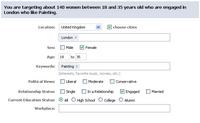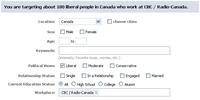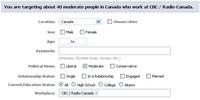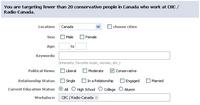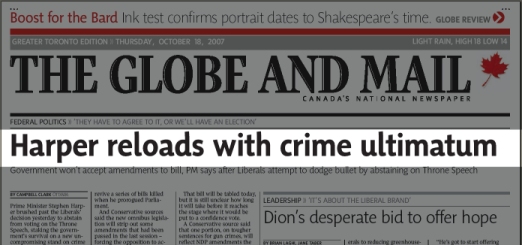Did anyone else catch this editorial by one of Ottawa’s most respected news veterans?
This lambasting of Prime Minister Stephen Harper has been featured on CBC’s Politics website for most of this week. Let’s take a look:
Prime Minister Stephen Harper has gone out of his way to let the reporters in the Parliamentary Press Gallery who cover him know that he doesn’t care very much about what they think.
Uh oh. PMO vs. Parliamentary Press Gallery politics was so early summer 2006, non? Don Newman seems to lament that Stephen Harper and Ottawa reporters were born in different pods. Besides, it’s Stephen Harper’s job to run the country. It’s the PPG’s job to care about what Stephen Harper thinks, not the other way around.
When he arrived in office with his minority government in 2006, Harper immediately had his communications staff tell the Gallery he would not hold news conferences in the theatre in the National Press Building.
He did, yes.
Never mind that every prime minister from Lester Pearson to Paul Martin had used the theatre to meet the press, along with a host of politicians, dignitaries and other notables. Even one of Harper’s heroes, Margaret Thatcher, held a news conference in the National Press Theatre during an official visit to Canada in the early 1980s.
No, Harper wanted to meet reporters in the foyer of the House of Commons, with the Chamber doors open behind him and Canadian flags in the background. A better visual image on TV. And if it looked a bit like the White House, so be it.
Yep, it seems we’re going there. As a veteran newsman, Newman knows that nothing appeals to his type of Canadians more than reductio ad americanum. What is Newman criticizing here? That the builders of Parliament made the foyer and House look like the White House from a certain angle, or that our Conservative cowboy Prime Minister chose it. From one angle, we see the House of Commons. From another (which bends around a few planes of reality), it’s the White House.
But the change of venue wasn’t the cause of friction between the Prime Minister and the people who cover him.
Really? (See above)
At Prime Ministerial news conferences in the Press Gallery Theatre, the President of the Press Gallery is the chairman of the event. The President is elected for a one year term by his or her peers.
And the Prime Minister’s government was elected by the people of Canada. Who’s authority are we appealing to here? The Parliamentary Press Gallery – and by extension, its President – are not elected by the people of Canada, does not exist by any law or statute written or ratified by the people’s representatives in Ottawa (or any other jurisdiction). The PPG is a club, with limited and exclusive membership.
Questioners are selected on a first come basis as they identify themselves to the President.
This would seem fair, however, first and foremost it would seem that a press conference is a consensual affair entered into by two (or more) participating parties. Further, the President and the gallery doesn’t recognize anyone outside of the club. The Gallery fashions itself as the gatekeeper to access to federal politicians in this Canadian Parliament. I remember reading of a time when freedom of the press was something that some journalists fought for. They used to fight for access, now they control it.
But in the new world order of Harper press conferences,
yeah, he went there. But let me take this opportunity to contrast the “old world order” that Newman is accustomed to with that which exists today. Twenty-four-hour cable news, blogs, gaffe-amplifying Youtube, the online social network, and even Peter C. Newman’s hidden tape recorder are today’s norm. The Prime Minister may wish to limit access because the demand for access has gone up as reporters try to score the next “Puffin” piece to wedge between commercials for sit-down showers and CHIP reverse mortgages.
a list of questioners is prepared by a member of the Prime Minister’s staff, from the names of reporters who indicate they want to ask a question. With control of the list, the Prime Minister’s staff can control who gets to ask a question. People the Prime Minister doesn’t like, or who ask tough questions, can be ignored.
When the Toronto Blue Jays or General Motors holds a press conference, is it not generally run in the same way? There is a press secretary/liaison that calls upon journalists with their hands up. Oh, the lessons we learned in kindergarten. The teacher may not call upon the bratty kids, but knows that those kids/reporters will still act in a way or write what they like.
When the Harper regime
regime!
tried to install
install!
this system after taking office, it was claimed the new approach was needed to provide more decorum around the Prime Minister. But formal news conferences by Prime Ministers have never been impromtu scrums. Reporters sat in theatre seats and only got to ask a question when their name was called by the Press Gallery president.
It was clear immediately that control
control!
of the list, not decorum, was the issue. At first no one in the press gallery agreed to the new procedure. But after a couple of months, under pressure from the owners or managers of their companies, the solidarity of the gallery
solidarity! (but not forever, sorry). Isn’t the press supposed to be in Ottawa to observe? It seems that they are participating in politics.
cracked and a number of reporters now go on the list of the Prime Minister’s flack
Dimitri’s a stand-up guy, I’ll have you know.
and ask questions when he holds a news conference.
Privately, friends and supporters of the Prime Minister admitted Harper wanted to limit the press because he believes most reporters were not sympathetic to his political programs. And he didn’t want to encourage any problems that might create.
In some circles we call that hearsay. We finally learn of the Prime Ministers real motives and it’s backed up by private conversations?
And pushed around or shut out, you might think that members of the Parliamentary Press Gallery would be attacking Harper at every chance they got.
Pushed around, shut out, attacking! What an image of a violent struggle.
But a funny thing has happened.
Harper has received generally benign coverage. Why?
Because Harper has abandoned or paid only lip service to most of the progams considered either controversial or far to the right on the political spectrum.
Considered by whom? This is your opinion piece, Mr. Newman…
Instead he has adopted entirely new attitudes on climate change, Quebec, and a number of other issues.
Attitudes most in the Press Gallery think are more moderate, more mainstream, more “sensible” than his previous positions.
It’s fantastic that our unelected, access-self-entitled, exclusive club of journalists in Ottawa have work-influencing and expressed opinions on policy matters and whether or not they are “sensible”. Those private conversations, Mr. Newman? Do you get the sense that the Prime Minister may have a point that his coverage extends beyond dispassionate and unbiased analysis?
So it has fallen to Harper’s former employee at the National Citizens Coalition, Gerry Nichols and others in the Conservative movement, to point out and criticize what are clearly major policy reversals. Policy reversals his former allies say are the “Flip Flops” of Harper the Prime Minister.
Harper just can’t win! He’s applauded for taking “sensible” mushy positions on one hand but on the other he’s a flip flopper on conservative principles and still draws criticism from Newman via Nicholls!
For the most part, embattled as they are with Stephen Harper and his communications helpers, Parliamentary Press Gallery journalists have not raised the “Flip Flop” issue.
“Embattled” is a press term that we hear when journalists believe that a news figure is in trouble (usually with their political party or the electorate). Since “embattled” is a subjective term, what happens when the press uses it to describe the Prime Minister’s relationship with itself?
The Prime Minister may have changed his mind but if he now agrees with most reporters, that kind of a “Flip Flop” is clearly enlightenment.
Don Newman’s politics indeed.
